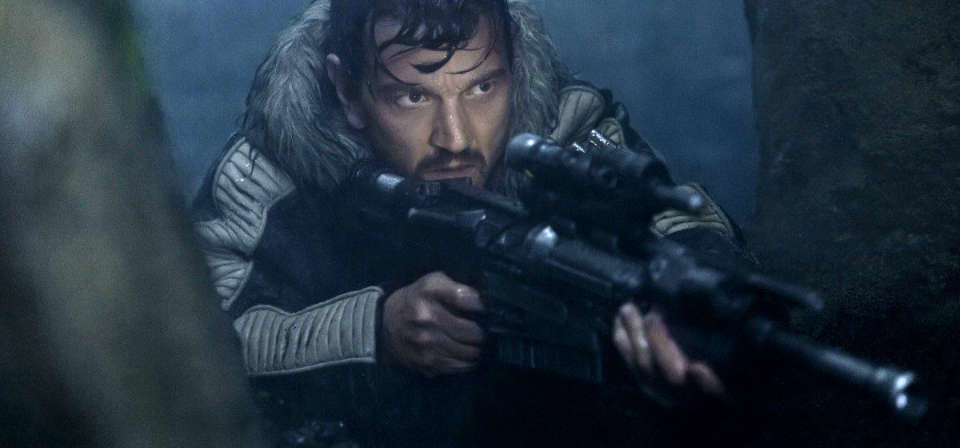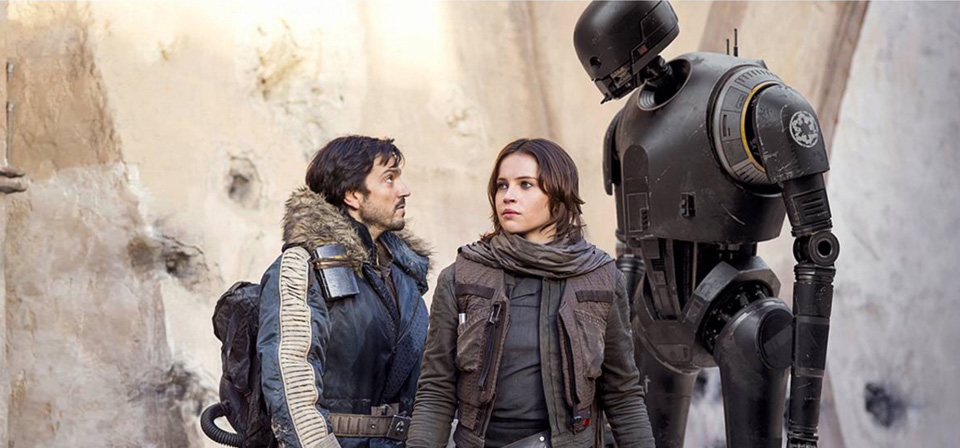John Paul the Great professor defends Rogue One
Thomas P. Harmon, professor of theology and culture at John Paul the Great Catholic University, has written a thoughtful essay for Catholic World Report responding to my critique of the moral murkiness of Rogue One: A Star Wars Story. Harmon argues that the new film better comports with the original series than I allow.
I thank Professor Harmon for his thoughtful response to my article.
We are in substantial agreement on a number of points. Harmon acknowledges that Rogue One is far from a perfect film, and sympathizes with with my concern about the general trend of moral murkiness in contemporary Hollywood retellings.
I agree with Harmon, too, that characters in the original films aren’t always as morally clear-cut as one might conclude reading my current article in isolation. (I have written about this in the past, though in this piece I lacked the space to do more than gesture at it.)
Not all of Harmon’s examples strike me as equally persuasive or relevant. In particular, the moral murkiness of Han Solo (whose moral arc my article treats at length) and Lando Calrissian are not counterpoints to my argument. My contention is not that the original Star Wars films are populated with characters who are all simply good or simply evil. Rather, I argue that the original films present us with “a more or less straightforward moral tableau of archetypal good and evil” represented by two opposing sides, the Empire and the Rebellion. The Empire are the black hats, the Rebellion are the white hats. Han and Lando as we first encounter them are morally murky because they aren’t aligned with either of the two sides.
Once they do join the Rebellion, this changes. As I said in my separate review of Rogue One concerning Han, “when he joined up he put on the proverbial white hat, even if he wore it at a rakish angle.” The same is true of Lando.
Harmon is on more persuasive ground when he points out that even in the original trilogy Yoda and Obi-Wan ultimately seem less wise and enlightened than they appear at first. Although Yoda’s initial warning to Luke in The Empire Strikes Back not to confront Darth Vader could be seen to be borne out by the end, in Return of the Jedi Luke’s refusal to fight his father is clearly vindicated over Yoda’s and Obi-Wan’s rejection of any possibility that Vader might be turned from the Dark Side.
Just as glaring is Obi-Wan lying to Luke about his father, ultimately rationalizing his words as “true from a certain point of view.” It’s worth noting that this wasn’t Lucas’s original intention. At the time Star Wars was shot, Lucas had not yet hit on making Darth Vader Luke’s father, so Obi-Wan’s lines were originally intended to be true. When Lucas decided that Vader was Luke’s father, he then had to explain why Obi-Wan would lie when this seems to go against the archetypal nature of the character.
Obi-Wan’s “from a certain point of view” rationalization is a retcon, a retroactive reinterpretation of past continuity to square with later creative developments. Still, it’s an ambiguity that is baked into the cake by the climax of The Empire Strikes Back, the backbone of the trilogy, so it can’t be bracketed by casting aspersions at the flaws of Return of the Jedi.
The examples Professor Harmon cites from the prequel trilogy are more problematic, in my view. This is a question from which I deliberately prescinded in my article, but since Harmon raises it, I must address it now.
It is true that the stern, complacent Jedi order we see there is somewhat at odds with the glowing picture described by Obi-Wan in A New Hope (“guardians of peace and justice in the Old Republic” during a “more civilized age”).
By the same token, it’s hard to square the affection and respect with which Obi-Wan speaks of Luke’s father (“the best star-pilot in the galaxy, and a cunning warrior…a good friend”) with the petulant, resentful, trying youth we meet in the prequels. And while we could conclude that Obi-Wan was distorting the record here as well, there’s an additional problem: It’s just as hard to square the Anakin we come to know in the prequels with the terrifying villain we already knew in the original trilogy.
If we take the prequels seriously, we must conclude that Obi-Wan was also lying when he said Luke’s father wanted him to have his lightsaber, but Uncle Owen wouldn’t allow it (“He feared you might follow old Obi-Wan on some damned-fool idealistic crusade like your father did”). None of this makes the slightest sense in light of the events we see in the prequel trilogy — and unlike “Darth Vader betrayed and murdered your father,” none of this can be claimed to be true “from a certain point of view.”
The enormous effort necessary even to try to square the prequel trilogy with the original trilogy, for me, isn’t worth the effort. The problems are simply too overwhelming.
I find it easier and more satisfying to say that in the original trilogy Lucas gestured toward a grand vision of the Jedi and of Luke’s origins that he was unable to realize in a persuasive way when he set out to tell the backstory.
Influenced by mythic epics like The Once and Future King and The Lord of the Rings, Lucas originally imagined a wise and noble Jedi order in the distant past. When he turned his gaze to that distant past, his inspiration failed him and he went in a more banal direction.
It’s not unlike a small contradiction within the original trilogy itself: When Obi-Wan allows Vader to cut him down in A New Hope, Lucas has him say, “If you strike me down, I shall become more powerful than you can possibly imagine.” This line was influenced, I believe, by the transformation of Gandalf the Grey into Gandalf the White.
But Lucas lacked Tolkien’s imaginative and spiritual depths (Tolkien was drawing, of course, on his belief as a Catholic in the resurrection, notably the resurrection of Jesus), and so his later portrayal of the postmortem Obi-Wan never delivers on these words.
Obi-Wan seems diminished, not more powerful; he doesn’t even seem wiser or more enlightened. (Yoda has to remind Ghost Obi-Wan that Luke is not their last hope — that there is another — and it’s Ghost Obi-Wan who delivers that rationalization about “the truths we cling to” depending on our point of view.)
We can overlook this because it’s one portentous line. The creative failings of the prequel trilogy are much harder to overlook. Although I value the prequels in some respects, I simply can’t regard them as fully telling the same story as the original trilogy — and I’m not alone in this, as Harmon is well aware.
A big part of the fan love for last year’s The Force Awakens was simply that it felt of a piece with the original trilogy, washing away the bad taste of the prequel trilogy. Fans felt that they had gotten “their” Star Wars back again. I felt it myself; it was this feeling that was responsible for my affectionate but lukewarm review.
The burden of my critique of Rogue One is that it no longer feels of a piece with the original trilogy — and this in a film that dovetails with the setup of A New Hope far more tightly than the prequel trilogy, making the tonal and narrative contradictions more glaring. Harking back to the prequel trilogy and pointing out how Lucas compromised the Jedi order is not, for me, a persuasive response.
I agree with Harmon — and stated in my article — that Rogue One does chart a redemptive arc for the morally compromised Rebel fighters led by Cassian Andor. Harmon compares Andor’s arc to Han Solo’s; the difference is that Han’s redemptive arc tracks with being a loner who believes in nothing to committing to the Rebel cause. Andor is already a committed member of the cause, but this no longer carries (doesn’t yet carry?) the moral white-hat expectations from the original films.
Harmon’s least persuasive stroke, in my opinion, is suggesting that Rogue One “allows us to glimpse the Rebellion without Skywalkers” — a Rebellion “strongly tempted to become a terrorist organization,” but ultimately resisting this temptation “because of the leadership and example of Leia and eventually Luke.”
First, the Rebellion isn’t without Skywalkers; Leia has been with the Rebellion for some time (“You weren’t on any mercy mission this time”).
Second, the idea that Leia and Luke are personally responsible for the moral character of the Rebellion — shrinking the Star Wars universe still further by making everything more and more about the Skywalkers, a notable pitfall of the prequel trilogy — is not to my mind a felicitous one. Like his friend Biggs, Luke joins a cause he believes in, an “idealistic crusade.” He doesn’t have a transforming effect on it.
Third, Rogue One doesn’t offer a persuasive narrative of the moral redemption of a movement. Some Rebel characters follow a redemptive arc, but (spoiler alert) in the end they’re all killed, and what survives them is not the story of their moral redemption, but only the stolen Death Star plans.
Perhaps time will tell which of us is right. The real issue is not just one film, but a guiding vision at Disney. If I’m right, upcoming Star Wars films will exhibit more of the moral muddle I diagnose in Rogue One. If I’m wrong, Rogue One should appear as an anomaly in an ongoing series that will revert to the spiritually inflected archetypal good and evil characterizing the original trilogy.
I’d love to be proved wrong. I’m not holding my breath, though.
Related

What we lose when Star Wars goes to the Dark Side
Even features come with trade-offs, and the Marvelization of Star Wars is no exception. This might not be as clear in The Force Awakens — about as pure a work of nostalgia and homage as can possibly be contrived short of a shot-for-shot remake — as it is in Rogue One, where the Marvel-style engineering is more obvious.

Rogue One: A Star Wars Story (2016)
All this raises a question: When is a Star Wars movie not a Star Wars movie?
Recent
- Benoit Blanc goes to church: Mysteries and faith in Wake Up Dead Man
- Are there too many Jesus movies?
- Antidote to the digital revolution: Carlo Acutis: Roadmap to Reality
- “Not I, But God”: Interview with Carlo Acutis: Roadmap to Reality director Tim Moriarty
- Gunn’s Superman is silly and sincere, and that’s good. It could be smarter.
Home Video
Copyright © 2000– Steven D. Greydanus. All rights reserved.